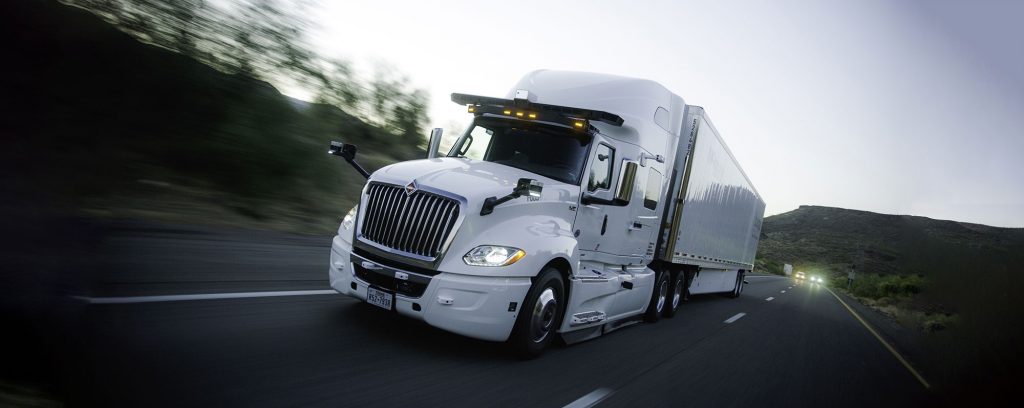
Autonomous driving technology firm TuSimple has successfully completed China’s first fully autonomous run of a semi-truck on open public roads without a human in the vehicle and without human intervention, the company announced earlier this month.
The new run was conducted on public roads and approved by the Shanghai government. It included the Yangshan Deep-Water Port Logistics Park, which is designed to accommodate the world’s largest container ships, and Donghai Bridge, one of the longest cross-sea bridges in the world. In February, Shanghai became the first city in China to pass legislation to allow tests of automated trucks with level 4 autonomy — that is, the ability to act without any human intervention in the vast majority of situations.
TuSimple became one of the first companied to receive a fully driverless test license in China earlier in June. Over the course of roughly 62 kilometers, TuSimple’s autonomous truck navigated complex road and weather conditions in both urban and highway environments within the port area. This included traffic signals, on-ramps, off-ramps, lane changes, emergency-lane vehicles, partial lane closures, fog, and crosswinds.
In order to ensure public safety, the TuSimple team worked closely with government regulators and law enforcement and implemented a safety vehicle to ensure security during the run. As of June, TuSimple China, a subsidiary of TuSimple, has accumulated more than 600,000 kilometers of test mileage, achieving zero incidents and road violations.
San Diego-based TuSimple accomplished the world’s first completely driverless semi-truck run on open public roads in 2021, with the vehicle beginning its 80-minute run from a large railyard in Tucson, Arizona. The class 8 truck, the heaviest class, traveled more than 80 miles on surface roads and highways at night to safely arrive at a high-volume distribution center in the Phoenix metro area.
“Being the first to conduct a driver-out run in China is a significant milestone,” Cheng Lu, president and CEO of TuSimple, said in a statement. “Following on from our successful driver-out run in the United States in 2021, this accomplishment marks another pivotal breakthrough for TuSimple and further underscores our leadership in the autonomous driving industry.”
Similarly, in June, TuSimple began level 4 autonomous test runs with trucks on Japan’s most critical freight corridor, which connects the major cities of Tokyo, Nagoya and Osaka. Japan’s freight industry faces a serious challenge of driver shortage and aging population, with Japan’s Ministry of Internal Affairs and Communications reporting in 2022 that 45.2 percent of the drivers in the country’s transportation industry were aged 50 or older. The Japanese government is planning to launch a self-driving lane on some sections of the New Tomei Expressway by 2024, and will allow commercial operation of level 4 fully autonomous trucks in 2026, TuSimple noted.
“Self-driving technology is a promising solution to the driver shortage issue that Japan’s logistics industry faces,” Lu said in a statement. “We aim to actively build business partnerships with local companies and develop the technology that will meet local customer demand. We are dedicated to providing the most reliable, safe and efficient autonomous truck solutions for the long-haul transportation industry.”
TuSimple has made a number of advances in recent years, such as becoming the first autonomous driving company to list on a stock exchange in 2021. In March, it announced its trucks have driven more than 10 million cumulative miles.
However, TuSimple has faced many recent setbacks as well. In May, it announced it was laying off about 30 percent of its global workforce to preserve cash. This followed a layoff of 25 percent of the company’s total workforce in December, about two weeks after its partnership with Navistar to develop autonomous trucks dissolved. In May, TuSimple also reported it faced a delisting notice from the Nasdaq for failing to file its quarterly report on time.
In addition, in March, TuSimple’s co-founder Xiaodi Hou resigned from the company’s board, with an SEC filing revealing an internal company investigation into claims that Hou was approaching TuSimple employees about leaving TuSimple to join a new venture of his. Moreover, according to an October report in The Wall Street Journal, TuSimple is facing probes from the FBI, the SEC and the Committee on Foreign Investment in the U.S. (CFIUS) over its relationship with Hydron, a hydrogen-powered trucking company led by TuSimple co-founder Mo Chen and backed by Chinese investors.

